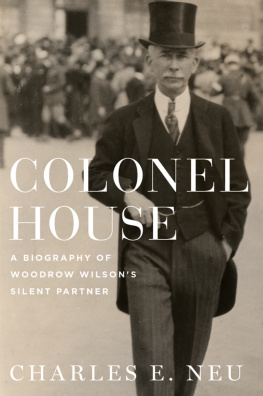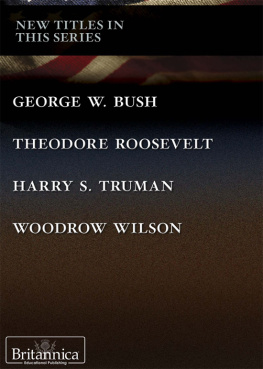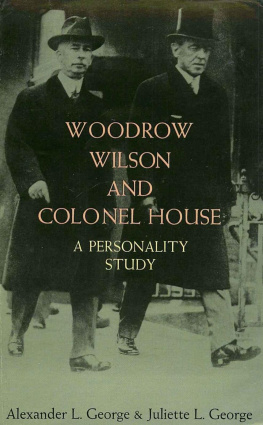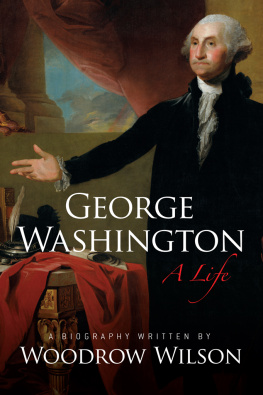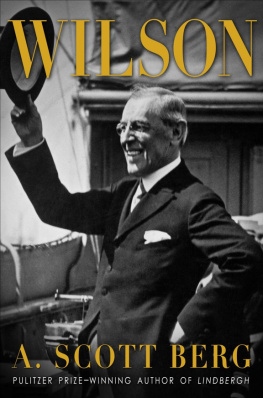COLONEL HOUSE

Oxford University Press is a department of the University of Oxford. It furthers the Universitys objective of excellence in research, scholarship, and education by publishing worldwide. Oxford is a registered trade mark of Oxford University Press in the UK and in certain other countries
Published in the United States of America by Oxford University Press
198 Madison Avenue, New York, NY 10016, United States of America
Charles E. Neu 2015
All rights reserved. No part of this publication may be reproduced, stored in a retrieval system, or transmitted, in any form or by any means, without the prior permission in writing of Oxford University Press, or as expressly permitted by law, by license, or under terms agreed with the appropriate reproduction rights organization. Inquiries concerning reproduction outside the scope of the above should be sent to the Rights Department, Oxford University Press, at the address above.
You must not circulate this work in any other form and you must impose this same condition on any acquirer.
Library of Congress Cataloging-in-Publication Data
Neu, Charles E.
Colonel House: a biography of Woodrow Wilsons silent partner/Charles E. Neu.
pages cm
Includes bibliographical references and index.
ISBN 9780195045505
eISBN 9780199391448
1. House, Edward Mandell, 18581938. 2. Wilson, Woodrow, 18561924Friends and associates. 3. StatesmenUnited StatesBiography. 4. United StatesForeign relations19131921. 5. United StatesPolitics and government19131921. 6. World War, 19141918Peace. 7. Treaty of Versailles (1919) I. Title.
E748.H77N48 2015
973.913092dc23
[B]
2014015227
For Sabina
Also by Charles E. Neu
An Uncertain Friendship: Theodore Roosevelt and Japan, 19061909
The Troubled Encounter: The United States and Japan
Co-editor, The Wilson Era: Essays in Honor of Arthur S. Link
Editor, After Vietnam: Legacies of a Lost War
Americas Lost War: Vietnam, 19451975
Co-editor, Artists of Power: Theodore Roosevelt, Woodrow Wilson, and Their Enduring Impact on U.S. Foreign Policy
Contents
Colonel Edward M. House led, by any measureincluding his ownan extraordinary life, one as big as the limitless prairies of the Gulf Coastal Plain on which he spent his youth. He experienced the turbulence of postCivil War frontier America and lived until the New Deal was fully enacted and World War II an inevitability. The mythology of that frontier and the heroic past of his state left a deep impression on him. After his father died on January 17, 1980, House left Cornell University and returned to Texas, where he married, pursued a variety of business activities, built an elegant mansion in Austin, and pondered his future. Though he later lived in New York and Bostons North Shore, went to Europe frequently, and became one of the most powerful Washington insiders in American political history, he was fundamentally a Texan.
When he had settled in Houston after his fathers death in 1880, House realized that he would not duplicate the feats of Texans who had molded a trackless wilderness into a great commonwealth. In 1885 he moved to Austin, both to escape the heat and humidity of Houston and to be closer to the political center of the state. He yearned for a political career and proceeded to build his own factionour crowd, as he called itwhich would become a potent political machine and a powerful force in Texas politics. House proved an effective political operatorarguably one of the greatest in American political historyskilled in organizing and inspiring others by working largely behind the scenes, developing ties of loyalty and affection with his close associates and using patronage to rally party workers behind his candidates. From 1894 to 1906, Houses protgs served as governors of Texas, all of them Democrats. One of these governors, James Stephen Hogg, bestowed the honorary title of Colonel on House, and three successive governors repeated the honor. The title stuck.
By the turn of the century House had grown tired of Texas politics and sought broader horizons. The energy and dynamism of New York fascinated him, and he began to spend more time there and on the North Shore of Boston. The first decade of the twentieth century became his twilight years. Now in his fifties, House had a sense of time passing him by, and he began to fear that he would not be able to find a place on the national political stage. He waited for the man and the opportunity, but the period from 1896 to 1912 was one of Republican ascendancy, and no Democratic leader emerged who could win the presidency. During these years House daydreamed, traveled to Europe, and wrote a novel of the future, Philip Dru: Administrator, in which the hero (featuring many of Houses characteristics) achieved a sweeping transformation of American life.
Colonel Houses moment came on November 24, 1911, when he met Woodrow Wilson, the governor of New Jersey and a leading candidate for the Democratic nomination for president. Only a few weeks after they met, House and Wilson were exchanging all kinds of confidences. Early in their friendship House asked Governor Wilson if he realized how short a time they had known one another. Wilson replied: My dear friend, we have known one another always.
They formed what would become, with Wilsons election to the presidency in November 1912, one of the most famous friendships in American political history. Although Wilson had a close marriage and a warm and happy family life, he often felt lonely and depressed, and yearned for male companionship. House appeared at the right time with a combination of personal and political qualities that appealed to Wilson. He had a gentle, deferential manner and was willing to offer assurances of affection and support. And Houses own apparently fragile health, especially his need to avoid warm weather, elicited the presidents sympathy and concern.
And in Wilson, House found a leader who embodied his moral and political values and who could move the American people toward larger goals. In the winter of 19121913 House joined a small circle of intimates around the president who were dedicated to advancing his presidency and to maintaining his physical health and emotional stability.
House realized that if he was to remain close to the president, he would need the help of well-placed associates, and he reached back to his Texas past. Partly through his efforts, three friends, Albert S. Burleson, Thomas Watt Gregory, and David F. Houston, entered Wilsons cabinet, and the two senators from Texas, Morris Sheppard and Charles Allen Culberson, labored to move Wilsons legislative program through the upper chamber. Wilsons presidency therefore marked the emergence of Texans as a powerful force in the national Democratic Party. Indeed, House would live to see Texans achieve a dominant position in Congress during the New Deal years and no doubt would have been pleased to see, in the second half of the twentieth century and beyond, the rise of Texas into a kind of superstate, one whose leaders would play a prominent role in national and world affairs.
In the Wilson administration, House became a high-level political intermediary, one who took on all sorts of tasks that Wilsonwho was a solitary figurefound distasteful. Working out of a small study in his New York apartment, he filled his days with conferences and phone calls. House was a patient, crafty, and sometimes cynical political infighter. He was not a deeply read man and nothing like the intellectual equal of Wilson. His great strength, and contribution to Wilsons presidency, was in the intangible realm of human relations. House patiently sifted through people and issues and helped rally various constituencies behind Wilsons legislative program.

